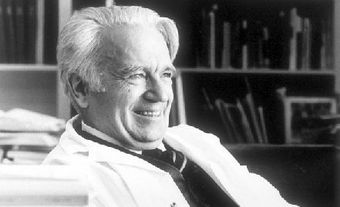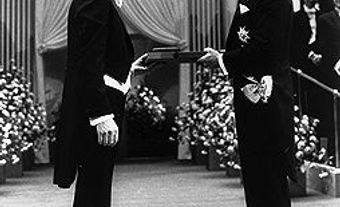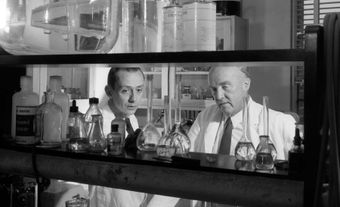Henry Taube, FRSC, chemist, professor (born 30 November 1915 in Neudorf, SK; died 16 November 2005 in Stanford, California). In 1983, the Royal Swedish Academy of Sciences awarded Taube the Nobel Prize in Chemistry “for his work on the mechanisms of electron transfer reactions, especially in metal complexes.” (See also Nobel Prizes and Canada; Chemistry.)
Henry Taube
Henry Taube during a press conference held at Stanford University after winning the Nobel Prize in Chemistry, c. 1983.
(credit: Bettmann/via Getty Images)
Education
Henry Taube was educated at the University of Saskatchewan where he studied with John William Tranter Spinks and took classes in physics from Gerhard Herzberg. From the University of Saskatchewan, Taube received a BSc in 1935 and a MSc in 1937. He earned a PhD from the University of California, Berkely in 1940 and remained in the United States, becoming a US citizen in 1942. (See also Canadian Citizenship.)
Career
Henry Taube taught at the University of California, Berkeley (1940-41), Cornell University (1941-46) and Stanford University (1962-86). While at Stanford University, he served as chair of the department of chemistry from 1972 to 1974 and from 1978 to 1979. Taube was made professor emeritus at Stanford University when he retired in 1986.
Henry Taube’s fundamental research into the mechanism of chemical reactions, particularly those involving inorganic materials, has been recognized by many honours and awards including the Nobel Prize in Chemistry in 1983. (See also Nobel Prizes and Canada.)
Select Honours and Awards
- Member, National Academy of Sciences (1959)
- Honorary Doctor of Laws, University of Saskatchewan (1973)
- Fellow, Royal Society of Canada (1997)
- Nobel Prize in Chemistry, Royal Swedish Academy of Sciences (1983)
- Priestly Award, American Chemical Society (1985)
- Foreign Member, Royal Society (1988)

 Share on Facebook
Share on Facebook Share on X
Share on X Share by Email
Share by Email Share on Google Classroom
Share on Google Classroom






